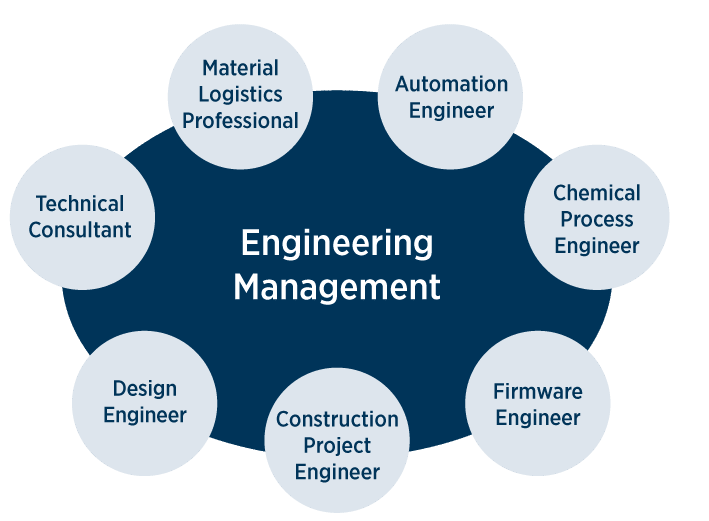Enjoy The New Audio Podcast Feature
There’s no getting around the fact that engineering is an expansive field. So, it is not unusual for someone to wonder where they would end up after earning a degree in engineering management.
Before we delve in-depth into the possible career paths of an engineering management graduate, let’s first define what a master’s degree in such a field is about.
In the simplest terms, a master’s degree in Engineering Management will teach you engineering and leadership skills. A Master’s degree in Engineering Management will help you prepare for managerial roles in engineering and related industries such as construction and architecture.
Many motivated professionals that pursue an engineering management degree have already gained considerable work experience as engineers. However, there are some students who will take this degree program to build on the knowledge from their bachelor’s degree.
Regardless, doing so allows students to narrow their focus areas while expanding their management and leadership opportunities in the job market Unlike other engineering fields, engineering management empowers students to establish industrial engineering skills and implement this expertise within a management context.
So, engineering management graduates are not just creators. They are also leaders, business experts and strategists in their respective job sectors. Speaking of job sectors, individuals with a strong background and a master’s degree in Engineering Management can work in various fields.
These include technical consulting, manufacturing management, logistics and chemical process consulting to name a few. Other than that, here are some career choices you may want to consider with your master’s degree in Engineering Management:
Career Choices After Engineering Management Degree

1. Project Engineers
Project engineers manage and lead teams for the duration of a particular project. A skilled project engineer needs to understand engineering principles related to a project’s design and functionality.
They also need to have the ability to lead unified teams effectively in addition to their Master’s degree in Engineering Management. It is, however, worth noting that the duties of a project engineer will vary depending on the field he or she is working on. For example, if you are a project engineer working in electrical engineering, your job will most likely involve optimizing electric vehicle speeds.
This is exactly the opposite for project engineers in civil engineering, who will most likely focus their attention on managing the development of a new bridge. Either way, working as a project engineer can be financially rewarding. According to Salary.com, US project engineers can earn up to around $88,000 annually depending on experience and qualifications.
2. Construction Manager
A construction manager career is also on the horizon for a Master’s graduate in Engineering Management. Usually, construction managers handle all the aspects related to the construction of a building. They will supervise and manage communications between engineers, building code managers, architects, construction crews and other professionals that help construct buildings.
A construction manager also designs and executes innovative solutions and faster processes that can resolve worksite obstacles and speed up processes. Their duties will also include ensuring that the project will adhere to government regulations. A construction manager will also create and revise comprehensive budget plans and interpret technical documents for other involved professionals.
3. Engineering Operations Manager
Engineering operations managers handle mechanical or electrical maintenance activities while supervising operations in the workhouse. An engineering operation manager will work with and supervise contractors and engineers in carrying out projects and daily activities.
They will also be in charge of building innovative project ideas, budgeting for projects and training their engineering teams. Depending on the company, duties may also include supervising work progress to ensure that teams meet deadlines and activities are carried out according to safety rules.
According to Glassdoor, an engineering operations manager can earn an average base pay of $96,540 with additional pay worth over $18,000.
4. Architectural Project Manager
The role of an architectural project manager is to manage the building and design of an architectural project. They will serve as a liaison between the construction workers and the architect or firm.
They will also be responsible for tracking all phases of the building process and consulting with the site project manager, the architect and other professionals about the progress of the project.
Other duties may also include maintaining project files such as material samples, drawings and correspondence.
5. Applications Engineer
Applications engineers are responsible for designing and improving software tools. They conduct required assessments with clients to understand unique project goals and ensure successful implementation. Most applications engineers are employed by application development firms with numerous clients from several industries
The duties of an applications engineer also involve providing technical support, hardware upgrades and making sales recommendations. With a Master’s degree in Engineering Management, applications engineers will be armed with the right skills for upselling and logging all technical requirements needed to reach peak system performance.
Is engineering management a rewarding career option?

Becoming an engineer is a long and demanding journey. So, it’s not common for someone to ask whether a career in engineering management is worth all the stress.
The reality is you are the only one that can answer that. Challenges are always a fact of life, and an engineering management degree is ripe with them. Engineering is one of the most innovative industries that future-focused professionals join in the hopes of solving real-world issues.
As an engineer, you will be responsible for deciding and executing technical objectives for your organization’s projects. That sounds challenging. Right? If you need some encouragement, here’s why
Engineering Management a Rewarding Career:

1. Creates More Career Opportunities
As you may have read above, the options for a master’s graduate in Engineering Management are endless.
From engineering sales and marketing and project management to senior management across many different types of organizations and industries, a degree in engineering management opens an entire range of opportunities.
This can be an excellent benefit considering the sudden market shifts in today’s job marketplace where people are getting laid off left and right due to budget constraints.
When you generate more opportunities, you can feel more secure in your position in the future job market.
2. Helps You Become a Leader
Engineering projects are usually complex even when they are on a modest scale. Many technical specialties and disciplines are needed to achieve the desired results and ensure a satisfactory level of reliability.
To bring these unique perspectives together and keep them aligned with organizational goals, engineering projects need someone to offer leadership. That’s where someone with a Master’s degree in Engineering Management can come in.
Engineering management programs strengthen leadership skills by enhancing your ability to mobilize people, finances and technology. This way, you can evaluate, innovate and stand out in the engineering industry.
In doing so, you can identify the right style of leadership that needs to be implemented on a specific engineering project to ensure success.
When you graduate from a master’s program, you will gain deep discipline knowledge that makes it easier to follow a step-by-step procedure in any sort of design scenario.
As an engineering leader, you can spearhead the impact in engineering trends and influence future engineering jobs through hiring, training and recruiting strategies.
3. Can Help You Feel like You’re Making a Difference
Feeling alive at work is something that every employee wants regardless of their profession.
When you are working for the greater good, you are more likely to be motivated, optimistic and make educated decisions.
While the hefty paycheck is reason enough to take an engineering management course, the benefits of getting a degree go further than that.
With the right skills and qualifications and a Master’s degree in Engineering Management as well, you can solve collective problems such as the challenges of hybrid cloud computing.
As a matter of fact, engineers have played a critical part during the current pandemic. According to the National Academy of Science Engineering Medicine, engineers were the catalyst in enhancing COVID-19 diagnostic exams.
When you feel as if you are working for the greater good, you will take pride in your profession knowing that your job is associated with a genuine social cause.
4. Allows You to Become a Better Business Person
When you get to the bottom of it, engineering management is all about business.
You need to not only take care of engineering and technical personnel but also communicate with people that create and revise budgeting plans to ensure that projects do not go over budget.
With engineering management, you can translate the language of your engineering discipline into the world of business and industry.
As a result, you can establish a better cohesion with individuals making commercial and financial decisions about the future of their projects.
Using the right skills, you can turn engineering ideas into financially viable projects that build shareholder values for the company you work for.
Engineering management also helps you learn how to design for profitability and commercialization.
This, in turn, results in the successful dissemination of engineering knowledge and putting it into the hands of people who will use it.
How to get started in engineering management?

Now that you have a definite understanding of the career paths for engineering management graduates, you might be wondering how to get started.
This can be especially challenging if you work a full-time job, have a family to take care of and cannot take time off work.
Plus, the costs of going back to university to get a Master’s degree in Engineering Management can be expensive. This is true, especially, if you are still trying to pay off your remaining student loans.
Fortunately, you do not have to worry about all that when you are enrolling in a master of Engineering Management online degree.
With online learning, you can save a considerable amount of money. At many universities such as Kettering University Online, the cost of tuition for an online program is often slightly cheaper than the cost of the on-campus version of the same program.
Even in the circumstances where this is not the case, getting your Master’s degree in Engineering Management online can save you financial strain in other ways.
You will no longer have to pay for a meal plan or housing on campus, and you won’t have the added cost of gas for driving back and forth from the campus.
Most of your learning materials are also offered in a digital format, which means that you will no longer have to spend money for books.
Whatever way you look at it, taking an engineering management course is extremely affordable.
On top of that, it allows for flexible learning. When you sign up for an online engineering management course, you get to fit your education around your life and not the other way around.
With a traditional on-campus engineering management program, classes are held at a scheduled time, but when you take it online, you can attend classes whenever it is most convenient for you.
If you like to study in silence, you can take your engineering management classes once everyone has gone to bed. If you are a morning person, you can wake up early and go to class before heading to work.
Are you buried with work on Thursday and cannot attend classes? You can go on the weekends instead.
When you can choose a time to learn, you increase the likelihood of taking the knowledge right in and applying it in real-life scenarios.
Sounds excellent, but are online engineering management degrees legit? Yes, they are. In fact, 83% of US employers believe that online degree programs have similar quality to campus-based experiences.
How do you get engineering management degree?

Depending on your chosen institution, admission requirements will differ, but here are some of the things you need to prepare to enroll in a prestigious online engineering university such as Kettering University Online:
- Official transcripts of records from all academic institutions attended
- Undergraduate degree of ABET-accredited engineering programs
- Resume
- Letters of recommendation
Master of engineering management courses online usually consists of 40 credits and includes at least 10 courses.
Depending on the academic institution you choose the average duration to complete a master’s degree program in Engineering Management is two years.
What does the curriculum look like?
The quality and reputation of an online Master’s in Engineering Management program will depend on its course curriculum.
While it will differ from one university to another, the course curriculum will usually combine core business principles with graduate-level engineering education.
In the degree program, students will learn the basics of management, behavioral science and quantitative analysis. They will also get to pick advanced engineering electives in their area of specialization.
For a cutting-edge university such as Kettering University Online, you will also have a chance to select a three-course graduate certificate in operations management, supply chain management, global leadership or healthcare management.
Among the courses you will most likely take while working towards your
Courses in Engineering Management:

1. Enterprise information system models
In this course, you will learn about the different roles of information systems in organizational relationships. The primary focus of the course is to understand how organizations are implementing processes globally using powerful software tools.
You will learn how tools such as product lifecycle management, customer relationship management, supply chain management and enterprise resource planning help organizations transform and achieve strategic objectives.
2. Ethics and practice of engineering
The importance of ethics in engineering is too hard to ignore. As an engineering manager, you must ensure that your team members are safe when performing work.
This means you need to see to it that your engineers and other contractors are working with standard and approved materials and adhere to engineering procedures.
This course will tackle the code of ethics for engineers and case studies on conflict of interest.
You will encounter comprehensive discussions in engineering management responsibilities and environmental considerations during the course.
3. People and Organizational Management
This course aims to prepare you for managing positions in manufacturing and engineering industries.
You will tackle important concepts and problems concerning the leadership and management of engineers.
Topics discussed will include persuasion, ethics, HR issues, lean thinking, business leadership, communication and change management.
4. Marketing Management
In this course, you can learn how marketing plays a vital role in connecting engineering firms with one another.
It will cover basic management topics and the best practices in managing supply chains, market relationships and strategy development.
Case studies and real-world samples will be used throughout the course to better explain complex issues and concepts.
5. Financial Management
Financial management is a two-part course that tackles the use of financial leverage and theoretical valuation of stocks and bonds.
In this course, you will learn how you can use financial leverage and take advantage of working capital management.
It also stresses the importance of legal and ethical leadership for engineering management students that aim to work in the financial sector.
Enroll in an engineering management degree today

Online learning has taken the engineering world by storm over the last decade. Gone are the days when the only way to earn a master’s degree in Engineering Management was by physically being on a university campus. You can start working towards earning your master’s degree today from the comfort of your own home.

